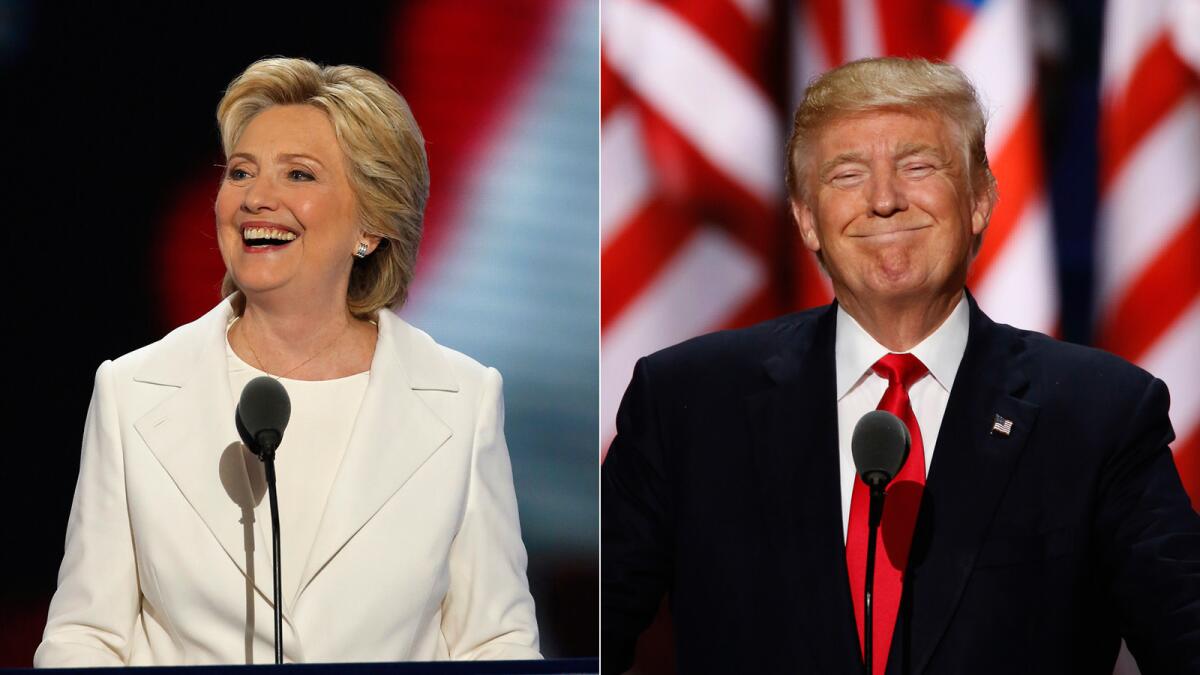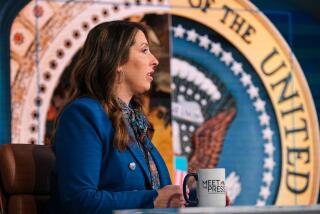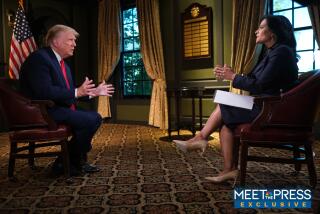Commentary: Looking for the human moments beneath the TV filters of the Democratic and Republican conventions

There are facts, and there is everything else — what we feel, what we believe, what we choose to disregard among what’s been proved real, and what we choose to regard as real that is demonstrably untrue. Every day brings a massive information dump impossible for any person to process, complicated by the fact that by the time the news reaches us, it has necessarily been shaped, shaded and colored.
While there are many ways the news gets around, we understand political conventions primarily as television events — gavel to gavel, as long each day as two and a third Oscar telecasts — staged and lighted and scheduled as such.
For the record:
5:00 a.m. July 30, 2016An earlier version of this article made it appear that the words in the final paragraph were those of John Kasich. They are the author’s.
“Four nights to produce a television show and without a filter to tell people your story,” CNN commentator David Axelrod called them during the just-wrapped Democratic National Convention in Philadelphia. But that is not strictly true, since the television show is itself a filter, a crafted event made up of carefully ordered speeches, celebrity cameos, musical interludes, shorts that use the tricks of film to make dramatic points, theatrical stagecraft and, in the Democrats’ case, comedy, hopefully making what’s manufactured feel authentic (and not always succeeding).
It’s filtered again by the networks that cover this political series, each in its own way, deciding when to show what’s happening on the podium and when to stick with its anchors and analysts; when it cuts from the stage to the crowd; and whom to look for there (the happy campers, or the unhappy ones). Even when the intention is to reflect what’s “really happening” in the room, such editorial choices add noise to the signal.

What you missed on the closing day of the Democratic National Convention. More coverage at latimes.com/conventions. See other Democratic roundups here and catch up on the Republian convention here.
Obviously, watching the convention of the party you oppose can be a deeply disturbing experience. And you can make it more distressing, if that kind of thrill interests you — that parachuting into enemy territory — by watching it on the network that supports and amplifies that party’s views.
But the effect of watching even your preferred convention through a scrim of punditry can create stress and anxiety. Cable news, especially, thrives on surmise, the constant discussion of things that have not happened yet and may well never happen. That’s not analysis or reporting but merely fortunetelling and guesswork. Nits are picked; the stirring speech that left you full of hope in short order will be torn apart like a turkey leg thrown to a pack of hungry dogs. Commentators will tell you what they think the politician or the party needs to do to win, as if addressing a question the politician or party were less well equipped to answer. Some of this speculation is informed and some of it is entertaining, and some of it will prove correct, but as information, it’s rarely useful.
The effect of watching even your preferred convention through a scrim of punditry can create stress and anxiety.
Each network has its quirks. Fox News, which often takes its cues from right-wing radio, has its dander up, is jokey in a drive-time way. The left-leaning MSNBC, whose coverage was co-chaired by Rachel Maddow and Brian Williams (who seems at once to be an anchor and playing one on TV), cultivates an air of head-shaking, shocked amusement. CNN, meanwhile, attempts to look serious and occupy the middle ground; the on-screen symbol of this during the conventions was its nine-person panel of commentators, including former Obama advisor Axelrod, social justice activist Van Jones and “Trump Supporter” Jeffrey Lord (his preferred title, apparently) — an almost statistical hedge against claims that the network is anything but balanced. But the welter of opinions can leave you feeling after awhile that nothing is true, and that you don’t know what you know.
See the most-read stories in Entertainment this hour »
What makes it to air on which venue can indeed feel partisan. Fox News had Florida Gov. Rick Scott announcing his new Trump super PAC while the Democrats discussed gun control; during Leon Panetta’s address, Bill O’Reilly was previewing the new season of his Fox News historical docudrama series “Legends and Lies.” And while Lena Dunham and America Ferrera were onstage, O’Reilly offered his much reported upon Tip of the Day “on Michelle Obama’s assertion that slaves built the White House” (they were well-fed and lodged, he said, and they didn’t build it alone).
But both Fox News and MSNBC ran ads during Jesse Jackson’s speech Wednesday — CNN carried it — literally declaring Jackson not just old news, but no news. CNN cut away from protests outside the Wells Fargo Center to broadcast a performance of Boyz II Men, a show business and not a political decision, perhaps, but one with political effects.
On Tuesday morning of the Republican Convention, I turned on no-frills CSPAN, doggedly faithful to recording the political world more or less unmediated, even when nothing much is happening. It was showing an off-site breakfast meeting, in Cuyahoga Falls, where Ohio Gov. John Kasich addressed the Michigan delegation; Kasich, of course, was a Trump opponent in the primaries and one of many Republican party leaders who declined to attend his convention.

Watch: Day Four of the Republican National Convention in less than four minutes. For more political coverage visit: http://www.latimes.com/trailguide
In contrast to Trump’s arena-filling speech on “death, destruction, terror and weakness,” the meeting was low-key, taken up with minutiae and practical matters, more personal than political.
Kasich was late. Waiting for him, Ronna Romney McDaniel told a story about driving around the country with her grandfather, Michigan Gov. George Romney, and her cousins “in a van eating egg salad sandwiches with pickles in them,” forced to listen to a cassette tape of the Mormon Tabernacle Choir, until an aunt slipped them some Beatles.
Kasich had a story too, which moved me and surprised me more than anything I heard coming from his party’s convention stage.
“And then we flew up to Marquette,” he remembered of one trip to Michigan, “and here’s the thing, when we got up there, everybody’s on their devices all the time, and I told everybody, ‘Turn ‘em off, look at where we are,’ and it was like a winter wonderland. I could not believe how beautiful it was.
“And then we went to the little restaurant there in Marquette, had some sandwiches. And there were so many people there who were with their kids for the hockey that was being played… and then we walked to … our town hall, and it was absolutely jammed and the people were lovely.”
It was life-sized, humble and human. All is not lost.
ALSO
The hug that will go down in history
Republican convention notes from The Times’ TV critic
DNC pulls out the stops on opening night, delivers a TV variety show
More to Read
The complete guide to home viewing
Get Screen Gab for everything about the TV shows and streaming movies everyone’s talking about.
You may occasionally receive promotional content from the Los Angeles Times.







